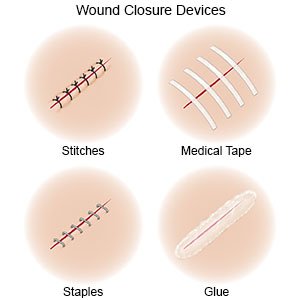Umbilical Hernia Repair
Medically reviewed by Drugs.com. Last updated on Aug 4, 2025.
What do I need to know about an umbilical hernia repair?
An umbilical hernia repair is surgery to place the bulge near your belly button back into your abdomen. An umbilical hernia may be repaired if the hernia prevents blood flow to your organs, blocks your intestines, or causes pain. Open surgery or a laparoscopic method may be used to repair your umbilical hernia.
How do I prepare for an umbilical hernia repair?
- Your surgeon will tell you how to prepare. Your surgeon may tell you not to eat or drink anything after midnight on the day of your surgery. Arrange to have someone drive you home when you are discharged.
- Tell your surgeon about all your current medicines. Your surgeon will tell you if you need to stop any medicine for surgery, and when to do so. You may be given antibiotics through your IV to help prevent a bacterial infection.
- Tell your surgeon about any allergies you have, including to medicines or anesthesia.
- Your surgeon will tell you if you need any tests before your surgery, and when to have them.
What will happen during an umbilical hernia repair?
- You will be given general anesthesia to keep you asleep and pain free during surgery. You may also be given local anesthesia to numb the surgery area and medicine to help you relax.
- During a laparoscopic hernia repair, your surgeon will make a small incision above your belly button. Your abdomen will be filled with carbon dioxide to lift the muscles away from your organs. This will help your surgeon see your hernia better and creates space to work. Your surgeon will insert a laparoscope. A laparoscope is a long, thin tube with a light and camera on the end. Other instruments will be inserted into 2 to 3 smaller incisions at different places on your abdomen.
- During an open hernia repair, your surgeon will make 1 incision near your belly button. The incision size will depend on the size of your hernia.
- In both types of hernia repair, tools are used to remove the hernia sac that contains bulging organs or abdominal tissue. Your surgeon will move your organs or tissue back into the correct place. Stitches may be used to close the opening in your abdominal wall. Mesh may be used to cover or plug the area. This will prevent the hernia from bulging out again.
- Your incisions will be closed with stitches, medical glue, or skin adhesive strips and covered with bandages.

What will happen after an umbilical hernia repair?
- You will be taken to a room to rest until you are fully awake. Healthcare providers will monitor you closely for any problems. Do not get out of bed until your provider says it is okay.
- You will be helped to walk around after surgery. Movement will help prevent blood clots.
- You may have pain, bloating, or nausea after your surgery. If you had a laparoscopic repair, you may have pain in your shoulder or near your ribs. This is from the carbon dioxide used during surgery. Incision site pain should improve within a few weeks. You may be given medicine to help manage the pain and nausea.
- You may be able to go home when your pain is controlled, you can drink liquids, and you can urinate.
What are the risks of an umbilical hernia repair?
You may bleed more than expected or get an infection. A pocket of fluid may form under your skin. This may heal on its own, or you may need surgery to remove it. Your umbilical hernia may return, or you may develop a hernia in a different location. Your organs, blood vessels, or nerves may be injured during surgery. Problems, such as a hole in your intestines, may happen during laparoscopic repair. This may lead to open surgery. You may get a blood clot in your leg, arm, or lungs. This may become life-threatening.
Care Agreement
You have the right to help plan your care. Learn about your health condition and how it may be treated. Discuss treatment options with your healthcare providers to decide what care you want to receive. You always have the right to refuse treatment. The above information is an educational aid only. It is not intended as medical advice for individual conditions or treatments. Talk to your doctor, nurse or pharmacist before following any medical regimen to see if it is safe and effective for you.© Copyright Merative 2025 Information is for End User's use only and may not be sold, redistributed or otherwise used for commercial purposes.
Further information
Always consult your healthcare provider to ensure the information displayed on this page applies to your personal circumstances.
